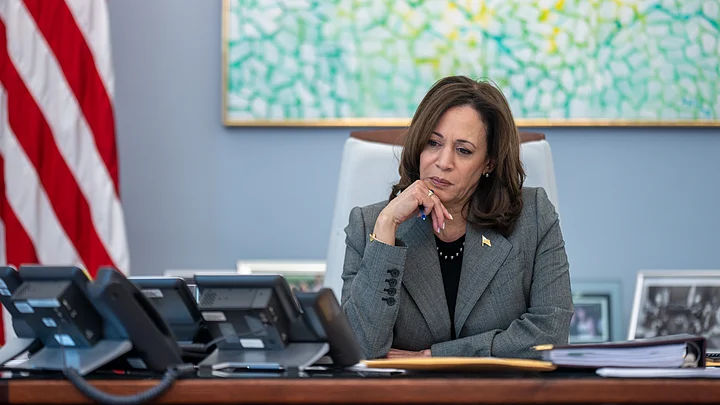Less than 24 hours after Biden’s announcement that he was dropping out of the presidential race, the Democratic Party’s presidential campaign committee raised fifty million dollars in small donations. Apparently, this fund-raising bonanza amounted to a historical record.
This development was certainly a most welcome portent for the Harris presidential campaign. That being said, there are a series of “known unknowns” — to borrow the inimitable phrase from George W Bush’s Secretary of Defence, Donald H Rumsfeld.
The first, of course, is Harris’ ability to close the rifts that have emerged within the Democratic Party. These are ideological, generational and gender-centric. The biggest challenge she faces will be to close the ideological gaps within the party.
A very substantial segment of the party believes, and with much justification, that it needs to focus on what is referred to as “kitchen table” issues in America. These have to do with the everyday cares of most working-class Americans: the high cost of rent, food and transportation.
For a complex set of reasons, since the waning of the pandemic, persistent inflation has affected all three and contributed to a palpable sense of precarity amongst a significant segment of the electorate. The Biden administration had done much to try and alleviate these concerns but with only limited success.
Others, within the party who are more affluent, and thereby have coped better with inflationary pressures, remain preoccupied with the so-called “culture war” issues having to do with questions of race, ethnicity and gender. Appeasing both these constituencies will not be an easy task especially as Trump’s campaign will seize on both of them with extraordinary ferocity.
The second issue, dealing with racial equality, is also generational. Older Americans, for the most part, are unlikely to be crusaders on this subject. However, for a younger generation of Democratic voters, this matter is far from trivial. To some degree, Harris’ mixed ethnic heritage should assuage these concerns. Nevertheless, it is a bit too early to tell how it will play out as the campaign heats up.
On the third issue, that of gender, she is on somewhat more secure ground. Admittedly, Hilary Clinton, who was the Democratic nominee for the presidency in 2016 was the first woman to reach that stage of a presidential contest. Harris, however, holds the distinction of serving as the first woman Vice-President.
Given Trump’s rather checkered record of dealing with women in a variety of contexts, her gender may well prove to be an asset with younger, Democratic voters. Nevertheless, given the former president’s mercurial disposition, it is impossible to predict how he is likely to handle this extremely delicate question.
These uncertainties aside, some of the lines of attack against her are already more than evident. Trump, who is known for his propensity to resort to personal invective and caricature, has referred to her as “laughing Kamala”. It is more than certain that he will again turn to such squalid characterisations including casting possible slurs against her ethnic background. The latter is likely to play well with significant sections of his political base who share those foul sentiments.
The Trump campaign is also likely to pounce on three policy issues that have considerable resonance with important segments of the electorate. The first is the vexed question of illegal immigration. Since Biden had largely placed Harris in charge of this matter the Trump campaign will do its utmost to depict her as the architect of a failed policy that did not secure the nation’s borders.
To that end, it will not use reliable evidence or facts and instead rely on lurid anecdotes about individual illegal immigrants who have committed heinous acts of violence. The framing of this issue in this dire fashion will, without a doubt, resonate with Trump’s supporters.
The other theme that the Trump campaign will hammer away at is that of persistent inflation even though it is already showing signs of tapering off. Harris, for a certainty, remains vulnerable on this score because the Trump campaign will deftly associate her with the Biden administration’s inability to rapidly bring inflation under control.
The final issue that she may have to confront is the Biden administration’s putative failures in the foreign policy arena. Without a shred of evidence, the Trump campaign will attribute the Hamas attack from Gaza on Israel as well as Russia’s invasion of Ukraine to Biden’s supposed lack of resolve and toughness.
Since Harris was his Vice-President, it will try to tar and feather her with these examples of apparent foreign and security policy failures. How her campaign responds to these dubious charges, in considerable measure, will determine whether or not they acquire any traction amongst the wider electorate.
During the 2020 presidential campaign, Harris’ team made a series of missteps that eliminated her from serious consideration at an early stage. It remains to be seen if she and the organisational apparatus that she will inherit from Biden’s second but abortive campaign can learn from those errors and perform better.
(Sumit Ganguly holds the Tagore Chair in Indian Cultures and Civilizations at Indiana University, Bloomington and is a Visiting Fellow at the Hoover Institution at Stanford University. This is an opinion piece and the views expressed are the author’s own. The Quint neither endorses nor is responsible for them.)
(At The Quint, we question everything. Play an active role in shaping our journalism by becoming a member today.)
